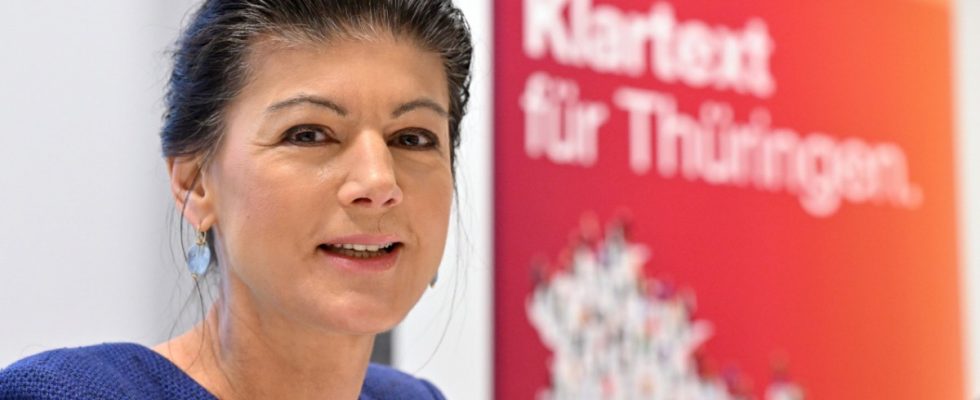Patience can be a virtue in politics, but for the Sahra Wagenknecht alliance it is a basic requirement. For months, the former top woman of the Left Party tortured her colleagues and opponents as to whether she would actually found her own party, when she would openly say so, and what political goals this alliance would pursue.
The time had come in January, and now things should happen quickly, especially in the federal states where a new state parliament will be elected this year: Saxony, Thuringia and Brandenburg. That’s why Wagenknecht announced himself in Erfurt on Friday to present what the alliance is now planning, which has the addition of “For Reason and Justice” in addition to its name. But first we have to wait again, Wagenknecht’s ICE from Berlin is late.
And so the mayor of Eisenach, Katja Wolf, sits alone on the podium and waits with camera teams and photographers for the namesake and main character. Wolf, a popular and high-profile local politician from the Left, is Wagenknecht’s biggest personnel coup to date. Her announcement that she was leaving the Left Party in favor of the BSW first prompted Prime Minister Bodo Ramelow to publicly complain about a personal breach of trust and then to spontaneously offer a cabinet position if Wolf stayed. She refused.
Top woman yes, top candidate maybe
On Friday she explained that the BSW in Thuringia would offer an “urgently needed alternative in terms of content” and would run for the local elections at the end of May. She avoids the question of whether she will run as the top candidate in the state elections on September 1st: “Of course I would like a place on the list that makes work in the state parliament possible, but the exact one is irrelevant.” Wagenknecht says: “Katja Wolf is our top woman, no matter how the state list is sorted. We are happy and grateful that she is joining us.”
Then Wagenknecht outlines the further schedule: founding of the regional association on March 15th, party conference on May 4th with adoption of the election program. She wants to develop this together with Thuringians through an online campaign. People should be able to vote on a portal which topics are most important to them: education, economy, migration, climate protection – their own suggestions are also possible. “Plain text for Thuringia” is the name of the campaign – and Wagenknecht announces that their alliance will not only make politics for the citizens, but with them. The aim is to convince people who want a different policy and to pick up those who are dissatisfied. However, the content doesn’t get much more specific than that.
No cooperation with the AfD
In Thuringia, says Wagenknecht, it is not unlikely that people will find themselves in a government after the state elections. This is also possible in Saxony. “But we don’t just want to co-govern, we want to change something.” You are not available as a majority procurer for “business as usual”. In surveys, the BSW was recently ahead of the Left Party in Thuringia, which has led a minority government with the SPD and the Greens since 2019. The AfD, which the Federal Office for the Protection of the Constitution has classified as definitely right-wing extremist, leads the polls with a clear lead over all other parties. Because the CDU rules out both a coalition with the AfD and cooperation with the Left Party, one can only say this much: forming a government will be difficult.
Wolf also cited this self-blockade as a motive for leaving the Left in favor of the BSW. The Frankfurter Allgemeine Zeitung She said: “It is clear to me at the moment that there can be no sensible coalition after the election unless there is a new political force. The BSW is therefore the right answer in a difficult time.” The BSW has already ruled out collaboration with Björn Höcke’s AfD, all other options remain open.
On Friday, Wagenknecht also used the radicalization of the AfD to justify why the BSW wanted to check carefully which members they were accepting. Once founded by conservative economic politicians, the AfD is now heavily influenced by right-wing extremists like Höcke or Europe’s leading candidate Maximilian Krah. “We will do everything we can to ensure that something like this doesn’t happen to us,” says Wagenknecht. Höcke is a right-wing radical, “We don’t want to have anything to do with people like that.
Höcke’s voters, however, want to convince Wagenknecht and Wolf that they are an alternative.

